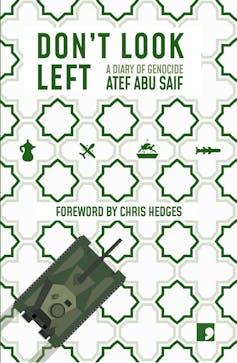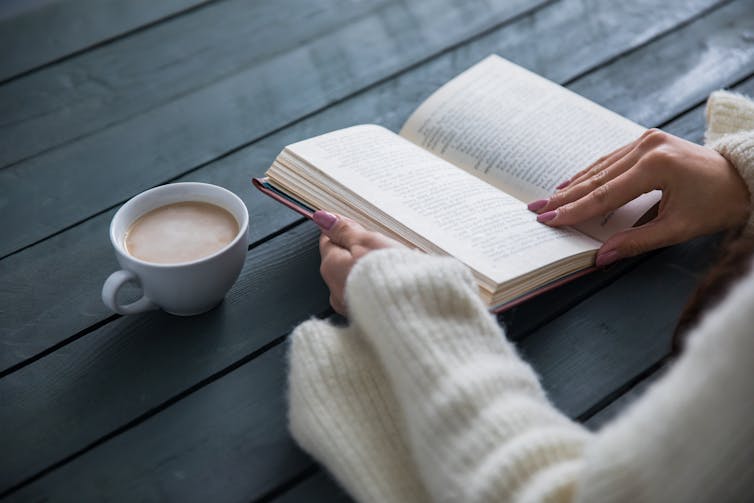Why do people even read books these days? There are so many other forms of information and entertainment that are much easier to consume. If you have 20 minutes to spare, why not just scroll through TikTok for a while or check out a news app?
But sometimes looking at small bites doesn’t work. Let me give you an example from my own reading. In late 2023 and early 2024, I followed the Israeli offensive in Gaza the way I normally follow the news. That is, I mostly read headlines and saw photos. I knew something shocking was happening, but it was precisely that feeling of shock that caused my brain to short circuit. I couldn’t follow the story; I couldn’t understand it.
Then my friend and research partner Claire Squires told me about a book she had just read: Don’t Look Left: A Diary of Genocide by Atef Abu Saif.

Alebaa News, via Wikimedia Commons, CC BY
Abu Saif, the Palestinian Authority’s culture minister, was visiting Gaza from the West Bank with his 15-year-old son when the bombing began. “Don’t Look Left” is his diary of the next 85 days, which he shared with his publisher via WhatsApp messages and voice memos.
Reading this book clicked with me in a way other media haven’t. Over the course of its 288 pages, I got to know Abu Saif, his extended family, and his friends. The diary format and ever-present threat had the immediacy and urgency of news media, but the way the diary unfolded helped me see people and places in a new way. I learned the names and nuances of different neighborhoods – like the Jabalia refugee camp, where the author was born in 1973, and the tent city of Rafah.
Abu Saif conveyed what it was like to decide where to sleep safely each day. He describes seeking out the most fortified parts of a building and lying awake listening to rockets. I got a glimpse of the harrowing silent moments between bombings, staring out of broken windows at night. The texture of everyday life and survival amid terror – looking for food, finding a place to recharge batteries, checking messages from friends and family, helping neighbors sort through the rubble of bombed buildings – was woven into something profound that has stayed with me.
Since reading Don’t Look Left, I have been able to remain alert even when the news overwhelms me and to place the ongoing horrors in Gaza into the context of a deeper understanding.
Aesthetic and moral
Reading may seem invisible or silent at times, but it is a highly dynamic activity that is full of energy. In my book What Readers Do, I explain that reading is both aesthetic and moral.

Reading Don’t Look Left had an aesthetic dimension because the narrative structure offered me a form I could recognize and a pace I could absorb. It resonated with my brain and helped me make sense of the world around me.
It also had a moral dimension, because it allowed me to empathise with others. The book helped me see Gaza at eye level, as a person walking through the alleys and buildings, and not just as a series of aerial photographs.
Books still have their power. Amidst the entire range of digital media available – from binge-watching series to news blogs and funny videos – reading still has a place for many of us. Adaptable and long-lasting, books have not been replaced by new media, but are in no way inferior to them: they are circulating not only in print but also as audiobooks and online series; they are being adapted for other media.
Globally, the book publishing industry generated $132.4 billion in 2023, more than the film and music industries, but less than the video game industry. This figure has been stable for many years.
Book festivals are on the rise and celebrities are hosting book clubs on Instagram. Book sales have skyrocketed during the COVID pandemic. And reading books isn’t reserved for just one demographic. While many studies suggest that the majority of readers are highly educated women, reading is common across all age groups and cultures.
For example, a 2021 report on reading habits in the United States by Rachel Noorda and Kathi Inman Berens found that avid book lovers were younger and more ethnically diverse than the general survey population.

Daniel Tadevosyan/Shutterstock
Solitary and sociable
Just as books endure and evolve, reading habits also change.
The moral and aesthetic dimensions of reading come into play in a number of different situations. Reading can be done alone, but also in social settings. It is a practice that sometimes incorporates digital technology and sometimes eschews digital in favor of print.
Readers act aesthetically when they use books to give style or structure to their lives. For example, people are drawn to different genres that resonate with their attitude to life, such as poetry or crime novels. I looked for a narrative form in Don’t Look Left that was meaningful to me. Other people may look for beautiful language, complex characters, or heroic adventures.
Readers also engage in aesthetic behavior when they visibly identify as book lovers: they post curated bookshelves on Instagram, dress up as a favorite character, or carry a Penguin Books tote bag. The books people read find their way into their lives.
Readers can use books to test their ideas of right and wrong. Some books present moral dilemmas that readers can use to clarify their own positions. For example, Richard Osman’s latest Thursday Murder Club book, The Last Devil to Die, raises the issue of assisted suicide.
Readers can also use books to develop the moral capacity for empathy by seeking out authors whose perspectives are new to them. For example, I am one of over 41,000 followers of the Blackfulla Bookclub on Instagram, which is run by Teela Reid and Merinda Dutton and highlights First Nations authors and storytellers.
People associate books with their personal and political views and express those views through social interactions. On social media, readers sometimes demonstrate moral behavior by expressing their views about the behavior of authors, publishers, or others involved in book culture. Maybe this is “cancel culture”—or maybe it’s simply activism and influence.
But reading can also be done quietly and alone. For some, private reading can be a sensual, even erotic pleasure: inhaling the scent of a book, lying on the beach or in the grass. For others, private reading can be a training in sustained attention, “deep reading” that helps the brain. And for others, it can be a form of mindfulness, a restorative balm to counteract the overwhelming aspects of modern life.
Reading alone cannot solve all problems. But it can help us gather the resources we need to live meaningful lives. It can be an exercise in helping us understand the world and our place in it.




